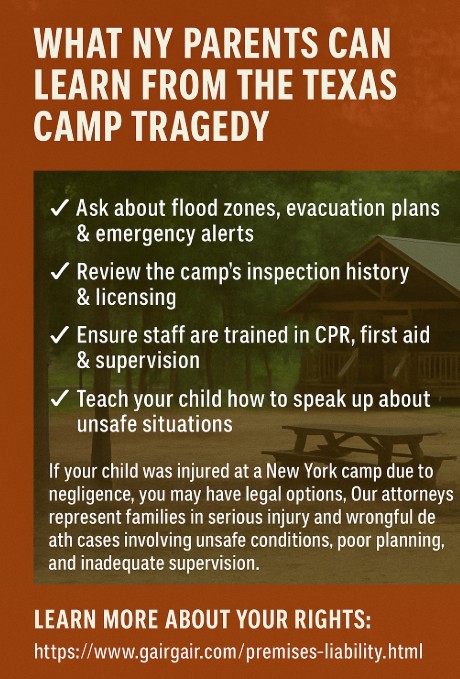What New York Parents Can Learn from the Texas Camp Tragedy: How to Protect Your Child at Summer Camp
 As New York personal injury attorneys who have seen firsthand how preventable negligence can change lives, we are deeply saddened by the tragic loss of life at Camp Mystic in Texas, where a catastrophic flash flood claimed the lives of dozens of children and counselors over the July 4th weekend.
As New York personal injury attorneys who have seen firsthand how preventable negligence can change lives, we are deeply saddened by the tragic loss of life at Camp Mystic in Texas, where a catastrophic flash flood claimed the lives of dozens of children and counselors over the July 4th weekend.
While the floodwaters surged in Texas, the ripple effects are being felt across the country — especially by parents preparing to send their children to summer camp in New York. The question on every parent’s mind: Could this happen here?
The heartbreaking reality is that camps — whether in upstate New York, the Catskills, or Long Island — are not immune from natural disasters, inadequate emergency preparedness, or lapses in supervision. But there are important steps parents can take to better protect their children and avoid preventable harm.
1. Ask Tough Questions About Emergency Planning
One of the most alarming revelations in the Texas tragedy is that the local flood alert system had been cut due to budget constraints. In New York, you should ask:
-
Does the camp have a real-time weather alert system?
-
Are staff trained to execute emergency evacuations?
-
Are emergency drills practiced regularly with campers?
Parents should never assume that a camp is prepared — insist on reviewing written policies and procedures.
2. Confirm the Camp’s Licensing, Inspections, and History
All children’s camps in New York State are regulated by the Department of Health. Before you enroll your child, research:
-
The camp’s operating permit.
-
Recent inspection reports and any violations.
-
Whether the camp has been involved in prior incidents or lawsuits.
If a camp resists sharing this information, consider it a red flag.
3. Evaluate Staff Training and Supervision
Inadequate staffing is a leading cause of camp-related injuries. Make sure the camp:
-
Performs background checks on all staff.
-
Maintains proper counselor-to-camper ratios.
-
Provides certified first aid and CPR training.
In moments of crisis — whether it’s a flood, fire, or medical emergency — properly trained staff can mean the difference between life and death.
4. Inquire About Site Safety and Risk Assessments
Ask the camp director:
-
Is the camp located in a flood zone or wildfire risk area?
-
Have risk assessments been conducted by qualified professionals?
-
What physical protections are in place (e.g., elevated sleeping quarters, safe shelters)?
New York is no stranger to severe weather, from flash floods to heatwaves — site selection and design matter.
5. Empower Your Child
Teach your child:
-
How to identify unsafe situations.
-
To report bullying, abuse, or neglect.
-
That they can say “no” to anything that feels wrong.
No safety plan is complete without involving the child directly in self-advocacy.
When Camp Negligence Causes Harm, Families Deserve Answers
While natural disasters can’t always be prevented, poor planning and failure to act can be grounds for legal accountability. If your child was injured or killed due to a camp’s failure to implement proper safety measures, you may be entitled to pursue a personal injury or wrongful death claim.
At Gair, Gair, Conason, Rubinowitz, Bloom, Hershenhorn, Steigman & Mackauf, we have represented families in some of the most complex and high-profile negligence cases in New York. We fight to hold organizations accountable when they fail to protect those in their care.
Call 212-943-1090 for a free, confidential consultation.
Your child’s safety is priceless. We’re here to help you protect it — and to seek justice when it’s compromised.
 New York Personal Injury Attorneys Blog
New York Personal Injury Attorneys Blog


